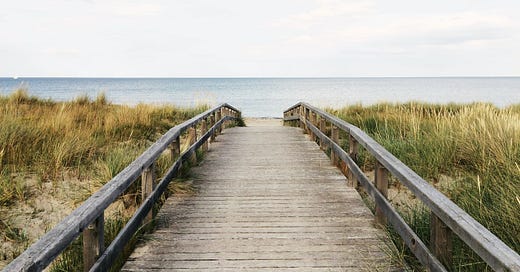It was July 2012, and I had a choice to make: Would I attend the exclusive conference hosted by Google that I’d been invited to, or go on the annual family vacation that had been booked months in advance?
At the time, it seemed like an easy enough decision. The Google Summit felt like a once-in-a-lifetime opportunity, and the family reunion happened each year. Plus, if I flew directly from the conference to the beach where my family was staying, I could still catch the last day and a half of vacation with everyone. What was there to lose?
To me, attending the conference was the smart, career-minded choice. It was held in Westlake Village, California, and was fancy beyond a level I was used to. A driver holding a sign with my last name greeted me at the airport. I stayed in a giant, all-expenses-paid room at the Four Seasons. We were treated to decadent meals. One night, the legendary blues musician Taj Mahal performed while conference-goers chatted over hors d'oeuvres. And, of course, the summit itself was fascinating.
But it was also lonely. I didn’t know anyone at the conference, and made small talk with strangers where I could. Meanwhile, on the other side of the country, my husband Jamie would text me funny family updates and photos of sweet messages in the sand.
The summit ended on a Wednesday, and I flew out of Los Angeles that night. The following afternoon, exhausted from jet lag, I landed in Savannah, Georgia. After a short drive to Tybee Island, I was finally reunited with my family. Even though we’d have to check out of the beach house in just two days, I was grateful to spend even a small bit of time with everyone.
Looking back, I have regrets about my decision. I didn’t anticipate how tired I would be after traveling from coast to coast, which made the time on Tybee less enjoyable than it could have been. I didn’t know that family vacation would be the second-to-last beach trip I’d get to spend with my dad. And I definitely couldn’t have predicted that I only had four more of those annual vacations left with Jamie. Looking back, there wasn’t much that I gained from that summit except for some bragging rights. Was it really worth it?
I was reminded of that conference-versus-vacation conundrum after reading Arthur C. Brooks’ latest column in The Atlantic. Several friends and acquaintances had shared the article, commenting on how much they recognized themselves in it. I was right there with them.
Brooks’ piece is all about “success addicts,” people who are constantly chasing the high of professional achievement. Those folks never seem to reach a point where they can pause for long, because true success—the next level of achievement—is always just out of reach. That’s how so many of us wind up in a perpetual state of dissatisfaction and unhappiness.
Success addicts, Brooks argues, choose being special over being happy. “People sacrifice their links with others for their true love, success,” he writes. “They travel for business on anniversaries; they miss Little League games and recitals while working long hours. Some forgo marriage for their careers—earning the appellation of being ‘married to their work’—even though a good relationship is more satisfying than any job.”
That’s what made me remember that Summer of 2012. Getting an invite from Google to attend that conference made me feel special. I probably would have enjoyed the family vacation more—at the very least, I would have been more relaxed—but I wouldn’t have done something worth putting on my résumé. I chose specialness.
Unfortunately, the high of success is fleeting. Brooks explains:
The goal can’t be satisfied; most people never feel ‘successful enough.’ The high only lasts a day or two, and then it’s on to the next goal. Psychologists call this the hedonic treadmill, in which satisfaction wears off almost immediately and we must run on to the next reward to avoid the feeling of falling behind. This is why so many studies show that successful people are almost invariably jealous of people who are more successful.
At the time of that Google conference, I was 27 years old, steadily climbing up the career ladder at CNN. I was managing a small team while trying to figure out how to excel at my job and be a good boss. There were a number of higher-ups in the organization whom I watched closely to see what moves I’d have to make to rise to their levels.
These successful colleagues worked long hours. They traveled. A lot. They were good at navigating business talk and making connections, and seemed to always have time for after-work drinks or dinner if it presented a valuable networking opportunity. Most of them were married, some of them with kids, yet they somehow seemed to make it work.
I modeled my choices after theirs. I said yes to any and all business trips, no matter what. I attended countless work-related happy hours. I logged onto my laptop during weekends and evenings—whenever there was breaking news. I tried to quiet the voice in my head that wondered if prioritizing work so often was a healthy thing to do.
Now, I look at those mentors in a different light. I can’t help but wonder how much of their personal happiness they traded for professional success.
My first back-step from the hedonic treadmill of success happened after my dad died. The last real conversation with my father was one where I complained about the work-related burnout I was experiencing. It’s among my biggest regrets in life. Couldn’t I have rambled on about my relationship with Jamie, or asked him questions that I now wish I had the answers to?
A year later, I left CNN and vowed to not let myself get into another job where I experienced such severe burnout. But I did. In my never-ending quest for success, I took on more and more responsibilities at my next job, and wound up traveling constantly. My next big career back-step, not surprisingly, happened after Jamie died. Eleven months later, I quit my job at Poynter and took several months off from work.
Lately, I feel like I’ve reached another stage of reevaluating my relationship with work and success. This time, it’s prompted by the COVID-19 pandemic. Business travel isn’t an option right now, and I don’t miss it one bit. Because the outside world is so stressful, I’m prioritizing finding calmness in our home and in myself. Chasing professional success isn’t nearly as important as it used to be, and I’m much happier for it.
I’m hoping that this time is the charm, and that I’ve officially stepped off that miserable treadmill. Brooks offers three tips for breaking the addiction of success:
The first step is an admission that as successful as you are, were, or hope to be in your life and work, you are not going to find true happiness on the hedonic treadmill of your professional life. You’ll find it in things that are deeply ordinary: enjoying a walk or a conversation with a loved one, instead of working that extra hour, for example. This is extremely difficult for many people. It feels almost like an admission of defeat for those who have spent their lives worshipping hard work and striving to outperform others. Social comparison is a big part of how people measure worldly success, but the research is clear that it strips us of life satisfaction.
The second step is to make amends, and to be more present in the relationships in your life. I can’t apologize to my dad or Jamie about past work-related mistakes, but I can fix those things now. I can be more present in my relationship with Billy. I can make time for phone calls and hangouts with dear friends. I can think about the kind of mom I want to be, and what values I want to impart to our daughter.
Brooks’ final step is to find better ways to measure success. “If you measure yourself only by the worldly rewards of money, power, and prestige, you’ll spend your life running on the hedonic treadmill and comparing yourself to others,” he writes. These days, I’m measuring success based on how my days go. Did I have enough time and energy for work and things like exercise, connection, and relaxation? Success! Did I learn something new today? Win! Did I do something that felt mentally or spiritually fulfilling? Hell yeah.
The family beach trip, like so many other things affected by the pandemic, is cancelled this year. If it wasn’t, I would have happily spent the whole week relaxing and reuniting with relatives, no regrets.
Instead, I’m making the most of family time at home. I’m slowing down and figuring out ways to show up for the people I love, even if it is from afar. I’m doing a better job of taking care of my mind and my body. I’m trying to care less about what other people are achieving in their careers and instead focus on my own happiness.
It’s all a work in progress, but you know what? It feels like success.
xoxo KHG
How are you rethinking work?
Many of us are working from home these days. For some, especially working parents, it’s a stressful situation. For others, it’s the ideal work scenario. No matter what, we’re all adjusting to new routines and schedules.
How have the last few months changed your relationship to work and success? Do you miss business travel, or is that something you’d like to leave in the past? Are you counting down the days until you can return to the office, or hoping that you don’t have to face your commute anytime soon?
Share your stories by replying to this email, leaving a comment, or sending me a message. I’ll compile some of your best replies in Thursday’s subscriber-only newsletter. (Reminder: Subscriptions are only $35/year or $5/month!) I can’t wait to read your thoughts.
My Sweet Dumb Brain is written by Katie Hawkins-Gaar. It’s edited by Rebecca Coates, who has been a full-time mom for years, but still finds many relatable lessons in Brooks’ article.
Photos courtesy Anton Sharov and Ameen Fahmy on Unsplash.
Want to support this newsletter? You can subscribe, tell a friend about it, send some monetary gratitude via Venmo (@Katie-Hawkins-Gaar), or hit the heart button at the top of this post. It all helps!







I think about this more and more the older I get. (OMG, I sound so old now). Anyway, my husband has always been good about prioritizing life over work. I don't know how he does it but he often says his job is a means to allowing him to enjoy his life. I've always admired that. As hard as I tried during my younger (and not so younger) years to keep some sort of balance, I kept slipping into prioritizing work over life... like if I missed an email, or an opportunity, the world would end. Guess what? It didn't. When I was laid off, I took a giant step back to look at how I was working and what I wanted to do. I realized all the time spent (aka wasted) chasing something that was never going to make me happy. I'm a work in progress but am trying something different this time.... an 'out of the box' approach to what kind of work I want to be doing now. It's scary, it can be lonely but I'm happier for it. And I'm lucky to have a partner who supports me and lifts me up when I question my decision to pivot my career. I'm finding more time for friends and family... really finding time. And time for myself to practice self care and nourish my soul.
Really insightful. Glad I stumbled upon this.